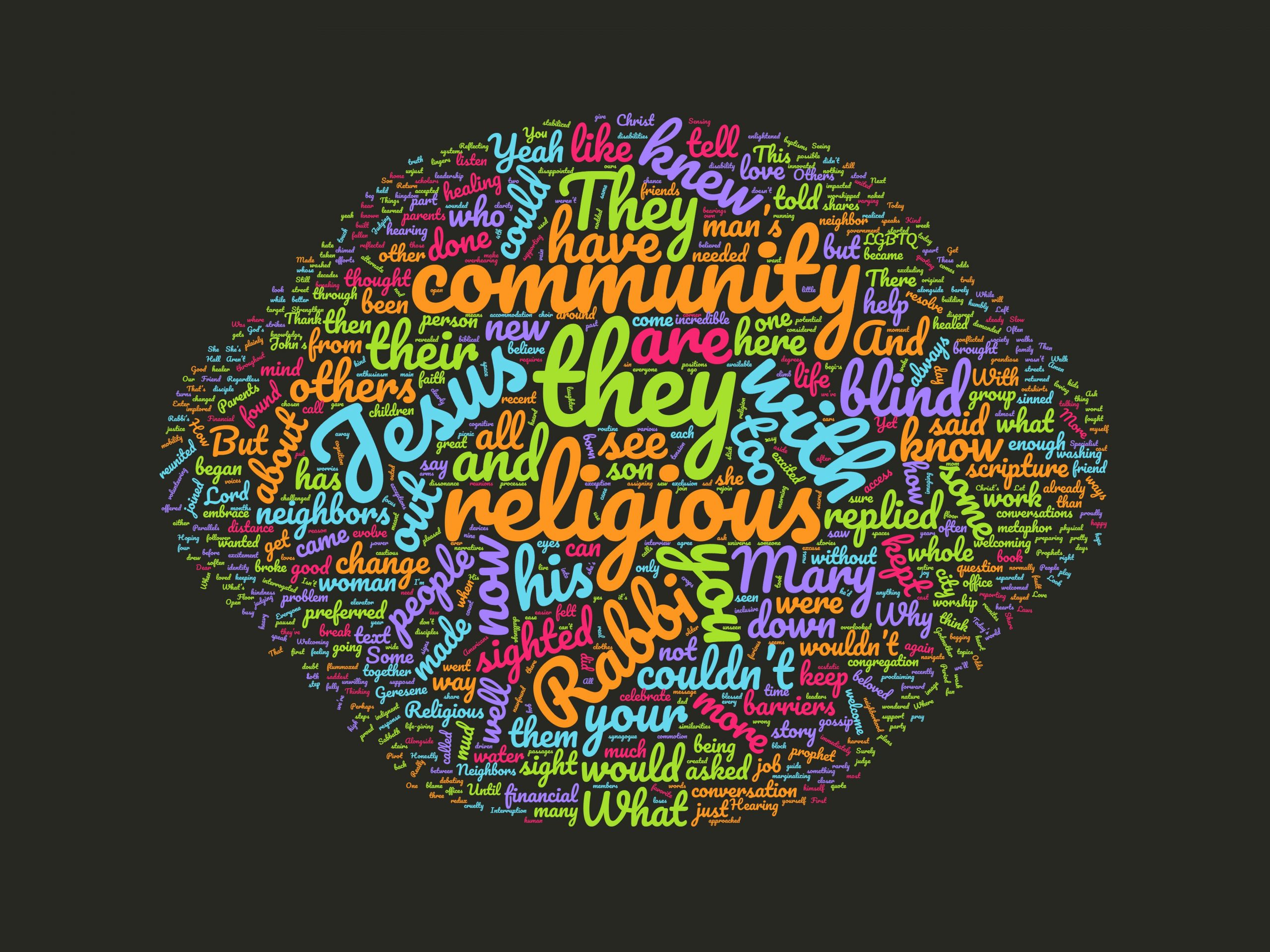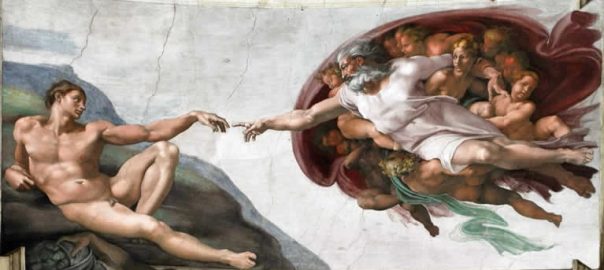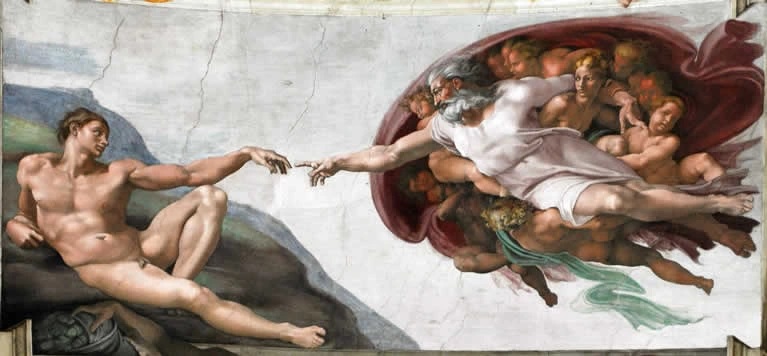A retelling of John 9:1-40.
The day started outed normally enough. The man woke, found his bearings, began his routine. His favorite street corner this morning was busy. Good, the man thought. Perhaps his efforts wouldn’t be in vain. But his begging only brought in so much. It was barely enough to get by.
The man was blind, yes, but that wasn’t his real problem. He could harvest crops, sew, tell stories from the heart. But most often he couldn’t get a job. People rarely gave him a chance.
And the religious types? Often, they were the worst. It was the religious types who kept him out of the synagogue. They kept quoting scripture as an excuse for their cruelty. He wondered if they knew what those passages meant.
This man too knew scripture.
He knew what the Lord requires:
To –
Do justice,
Love kindness,
Walk humbly with your God.
Why couldn’t the religious types focus on that?
Interruption
Then, in the distance, conversation. The man heard a group debating heavy topics like judging others, assigning blame, sin. Rabbi, one person asked, whose fault is it this man is blind?
The man knew, immediately, they were talking about him.
The Rabbi’s response sounded almost indignant. My disciples, the Rabbi said to the group, he was born this way. Made in the image of God.
The man couldn’t help but nod and agree. He knew, already, that he was enough. If only others could know it too.
The voices drew closer. The man then felt someone touch his eyes. Was that mud? Go, wash, the Rabbi implored.
The man went.
The man washed.
The man could now see.
He was ecstatic! Things like work, friends, community, going to worship, all that would now be easier, more possible. The man was sure of it. He began to make new, grandiose plans.
Neighbors
It was then when the conversations began.
First it was the neighbors. Seeing the man navigate the streets with ease the neighbors couldn’t help but gossip. Isn’t that the man that used to beg? Some nodded, yeah. Others disagreed.
The now sighted man, hearing the commotion, replied. I am that man.
He told them about –
the Rabbi,
the mud,
the water,
the washing,
the sight.
There would be no neighborhood picnic to celebrate. No words of excitement, enthusiasm, support. Why couldn’t they just be happy for him?
Religious types
Next it was the religious types. Hoping for clarity the neighbors took the man to them. How is it you now see, the religious types asked?
He told them, too, about –
the Rabbi,
the mud,
the water,
the washing,
the sight.
The religious types were conflicted.
Some said the Rabbi had sinned.
He broke the law.
It is the Sabbath.
No work is to be done.
The sighted man couldn’t believe his ears. There the religious types go again. They love to quote from their book. They love to use that book to judge.
The sighted man had newfound hope.
And the religious types?
They just wanted to keep him down.
Others weren’t so sure.
How could the Rabbi have sinned?
Look at the signs!
The cognitive dissonance between –
What the religious types knew from scripture,
(or thought they knew)
and the man that stood before them,
created a tension not easy to resolve.
What do you say about this Rabbi, the religious types asked the man.
The Rabbi is a prophet, he replied.
Prophets challenge unjust systems. The man knew this.
Laws that keep people like him down.
Parents
The man’s parents then chimed in. Kind of. Still flummoxed the religious types called for the sighted man’s mom and dad. Is this your son? If so, how can he see?
He is our son, they replied.
He was born blind.
He can now see.
We don’t go know how.
Ask our son.
He speaks for himself.
Hearing this disappointed the man. They knew how this came to be. Why wouldn’t they tell the truth? They could have said something like this is our son. With him we are well pleased. That would have been great, the man thought. Aren’t parents supposed to stick up for their kids?
Religious redux
The religious types returned to their original target.
We know the Rabbi has done wrong, they told the man. What say you?
I was blind, now I see, the man replied. What’s the problem?
But how did he do it? They demanded to know more.
The man had so much to look forward to. What with new ways to work, play, be in community, worship alongside others. Yet here was being interrogated by people unwilling to change.
I already told you, he replied to the religious types.
You wouldn’t listen.
Why do you want to hear it again?
Sensing their power being challenged,
The religious types were furious. Get out!
There would be no new access to sacred spaces for the man on this day.
The man realized, in that moment, he had seen the world around him clearly the whole time. For nothing, it seems, had changed.
Jesus
Enter Jesus. Hearing the religious types had driven away the person he’d just healed Jesus approached him. I am the Son of Man, Jesus revealed.
The man worshipped.
The man believed.
I am here to give sight to the blind, Jesus shares.
And some of the sighted?
It is they who are blind.
The religious types,
overhearing the conversation,
couldn’t help but ask…
Surely we are not blind, are we?
The question lingers with us still.
The sighted man knew, without a doubt, the identity of this healer.
More than Rabbi.
More than prophet.
Jesus is Lord.
With that knowledge the man became a follower of Christ. With it he joined a group who welcomed him with arms wide open. Alongside so many other cast aside they built community, together. As a disciple the man learned of Christ’s call to –
love your God, and to
love your neighbor as yourself.
The man was that neighbor.
He now felt loved, accepted, whole.
He wanted others to have that feeling too.
Parallels
Today’s text, to me, is one of the saddest in scripture.
It shares similarities with –
the story of the woman at the well, and
Jesus healing the Geresene man.
The woman at the well, after being enlightened by Jesus, runs back to the city to tell others about the life-giving water she has found. She’s so excited! Her neighbors listen. They join her. They get excited too.
The woman was reunited with the community she was estranged from.
The woman was made whole.
The Geresene man had been running around naked on the outskirts of the city. Jesus healed him. The man put on some clothes, was now in his right mind. Return to your home, Jesus asked of the man. Share your story with others. The man did, proudly proclaiming throughout the city all Jesus had done.
The man was reunited with the community he was estranged from.
The man was made whole.
The narratives for both end well.
We can say –
Yeah Jesus!
Yeah new life!
Yeah reunions with God’s beloved!
The text today begins the same way.
Christ reunites the man with his community.
Yeah Jesus!
Yeah new life!
And then? The community loses it’s ever loving mind.
The man’s –
Neighbors preferred gossip over a block party to celebrate.
Parents preferred keeping their distance over fully supporting their son.
Religious leaders preferred exclusion over welcome as they too often do.
And the government? Odds are they didn’t do much to help either.
The man’s healing offered him the potential to rejoin the society he had been separated from. And the man’s community? They fought that every step of the way.
Pivot
Some biblical scholars see this as a story of physical healing. To others it is a metaphor of what it means to be truly seen. These days it strikes me as metaphor. We all know what it is to be overlooked.
This man had been unseen his entire life by –
neighbors,
family,
religion.
As it turns out it is they who were blind.
But Jesus?
He saw the man.
Really saw him.
He broke down barriers,
that kept the man out.
Welcoming him, to
a new community,
available to all.
Today
Judging, marginalizing, excluding.
It is part of our fallen human nature.
Left to our own devices we’re pretty good at it.
Jesus calls us to more.
We are called to welcome everyone into community.
Regardless of, well, anything. Reflecting on this text two recent conversations come to mind.
Friend
This past week one of our members came out to me. I’m gay, they said plainly. That’s great I replied. No worries. It doesn’t change a thing. They went on to share that they are always cautious about who they tell. And for good reason, for years it could have impacted their job. We embrace the LGBTQ+ community here.
Period.
No exceptions.
To varying degrees St. John’s has for decades. We always will.
Yet for us to be an inclusive faith community – and we have more work to do – we needed to change. We needed to evolve. We needed to break down barriers that kept some people out.
Thinking through the conversation I reflected on the various leadership positions this person has held here, the volunteering they’ve done, the many friends they have made.
What if we had chosen not to change? What if we had stayed blind to the LGBTQ+ community and kept them out? It would have come at an incredible cost for us all.
Mary
A little over a year ago, our Financial Specialist Mary Hall came to St. John’s for an interview. When the question of office space came up Mary paused. Until recently our financial offices had no elevator access. Mary, I think, would be the first to tell you that stairs are not her friend.
Mary walks with a cane.
Slow and steady.
She always gets where she is going.
“I hate to think I wouldn’t be considered for the job if I can’t climb the steps to the 4th Floor,” she said at the time.
You better believe we made the accommodation.
Our financial office is now on the main floor.
In the time we’ve known each other Mary has –
stabilized our financial reporting.
innovated many of our processes.
became the Godmother for three of our recent baptisms.
joined our choir too.
All while she’s brought with her incredible joy, laughter, fun.
Everyone here loves Mary. I count her as a good friend.
But for her to be part of our community we had to change. We had to break down some barriers that keep people like her out. While preparing this message I found myself imaging life here without Mary. Honestly that alternate universe made my sad.
One in four American adults live with some kind of disability, be it mobility, cognition, sight or hearing. In an older building like ours, when it comes to welcoming people with disabilities odds are high we’ll need to evolve some more in this way too.
Let us pray.
Dear Lord,
Thank you for breaking down the barriers that keep us apart. For we know you call us to be together, as a people of faith. To be united, as One. Thank you for all you have taken this congregation to and through. We are blessed to be a welcoming community in ways we can be proud of. Where there is more to be done speak to us, guide us, soften our hearts. Open our eyes to see each other as you see us, as beloved children of God. Strengthen our resolve to embrace all your children, without exception. Until your kingdom come. Amen.







